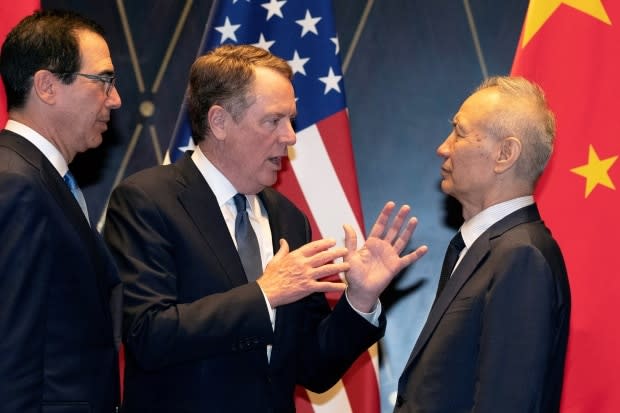Canada poised to lose lobster edge in China in wake of U.S. trade deal
Canadian lobster fishermen may soon lose their edge in the Chinese market thanks to a rule change that could exempt Maine lobster from punitive tariffs.
Trade measures announced this week will make a wide range of U.S. products, including live lobster, eligible for a one-year exemption from retaliatory Chinese tariffs.
In the immediate short term, the victory may bring few rewards for the Americans as China copes with the outbreak of the coronavirus.
Demand for live lobster has collapsed in the past month due to the outbreak, leading to the cancellations of many cargo flights from Atlantic Canada.
Still, U.S. Trade Representative Robert Lighthizer said Wednesday the tariff exemption that flowed from the U.S.-China Phase 1 trade agreement signed in January was a "positive result" for hundreds of American products.

Starting in 2018, China imposed a series of escalating tariffs during its trade dispute with the U.S. that eventually made Maine lobster 35 percent more expensive than those from Canada.
As live lobster sales from Maine tanked, Canadian sales soared — largely from Nova Scotia. During the first 10 months of 2019, Canadian live lobster sales to China were valued at $384 million.
The Maine congressional delegation issued a joint statement Wednesday in response to the tariff exemption.
"We welcome the promising development for Maine's lobster industry that China may exclude $300 million worth of U.S. seafood imports from tariffs," said senators Susan Collins and Angus King, and representatives Chellie Pingree and Jared Golden.
"It is encouraging that China appears to be taking more steps to uphold the purchase agreements reached in the Phase One trade deal, and we will continue to monitor these developments to ensure China fulfills its obligation to buy American goods, including lobster, in amounts that exceed the level of purchases in 2017."
Geoff Irvine of the Lobster Council of Canada was not surprised.
"We've expected this for some time," he told CBC News. "I think most people are generally supportive when we get back to free and open trade."

